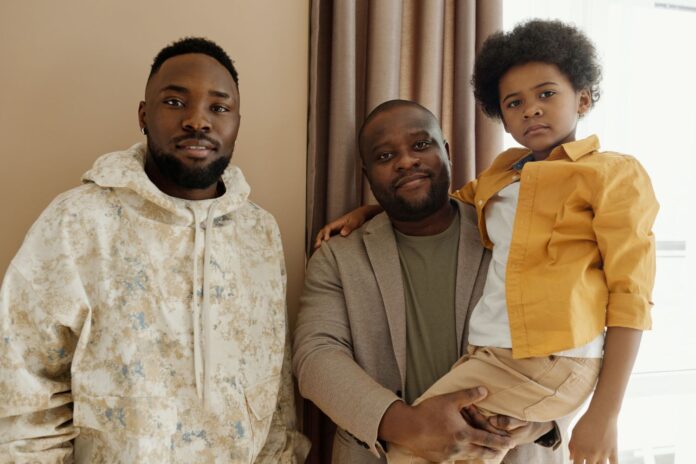
The way Jourdan Sorrell sees it, between microaggressions at the office, the threat of getting stopped or shot by police, and societal definitions of masculinity, Black men in America are in a constant existential struggle. With the stress of moving through a world that often sees them as a threat, there isn’t much time to decompress, let alone heal.
Coincidentally, the same thoughts were on the mind of his friend Darrious Hillman, when the two met for lunch in Chicago in April. As they dined, Sorrell, a Comcast senior manager, and Hillman, executive director for CAN TV, a local public access channel, found themselves talking about the lack of a safe space for Black men to truthfully answer the question, “How’s it going?”
That conversation led the two to create “Brothers Talking,” a monthly, hour-long program on CAN TV, the Chicago-based public access TV channel Hillman leads. Hosted by Dr. Obari Cartman, a professional psychologist, the show features a multigenerational group of Black men tackling topics from Black sexuality to toxic masculinity and the schools-to-prison pipeline.
“We’re all just trying to eat, live, and do what we need to do daily,” says Sorrell, talking with Hillman in a YouTube video about the show’s origin, and how difficult it can be for Black men to breathe. “Vulnerability is not necessarily on the top of the list of things we need to do when we get up and when you go to sleep every night.”
The simplicity of its format — six Black of different generations, men sitting in a circle, talking to one another — belies the significance of its mission: centering “the lived experiences of Black men — the pain, joy, success, failure, and the resulting opportunities for growth and self-discovery,” according to the show’s website.
We’re creating space to gather and demonstrate it for other men.
OBARI CARTMAN
In an interview with Word In Black, Cartman says the program’s goal is to create a safe space for honesty and vulnerability, which in turn can lead to healing from racial trauma.
Men talking to one another in male spaces, like barber shops and locker rooms, is nothing new, “but sometimes we do it in ways that can be superficial and miss the point,” Cartman says. “In my experience, men are good at ‘barbershop talk’ — trading opinions, theories, talking about celebrities, talking about women. Sometimes we posture a little bit,” all the while avoiding conversations about what’s going on in their lives.
The point of Black Men Talking is to “redirect the theoretical talk into their own personal experiences,” he says. “Not ‘This is what I think about it,’ but ‘This is what I feel. This is what I learned from my trials and tribulations.’”
Besides representing Black men of different generations, each of the regular panelists comes from different socioeconomic backgrounds, political perspectives, and sexual orientations. At the top of every show, they take a few minutes to discuss their progress on a life goal they’ve set for themselves before digging into the main topic of conversation.
The mission is to help Black men and boys be our best selves, be aware of the strengths we have.
OBARI CARTMAN
Even the manner in which they sit contributes to the goal of honesty and healing, Cartman says.
“It’s a roundtable, but there is no table — it’s like a peace circle,” he says. “The goal is to connect to ancient Indigenous formats of problem-solving and connections, looking eye-to-eye. The circle itself represents a sort of sacred space.”
Although his job is to keep the conversation going, “I support them to the extent that I can, as another Black man that ‘s trying to figure it out myself,” says Cartman, whose expertise includes Black masculinity, restorative justice, and trauma-informed care. “The mission is to help Black men and boys be our best selves, be aware of the strengths we have.”
Cartman says racial healing is at the center of the program, and not just for the men on camera.
“When I think about the diagnosis, the analysis of the harm, a lot of it has to do with long harm — racial trauma, generations of a system in place that brought our ancestors to this country,” Cartman says. Black people in America, he says, are subject to “a lot of spiritual, emotional, psychological warfare. I think we are still unpacking and undoing some of the damage.”
The repair, “includes bringing (people) back into a community space to remember who we are,” Cartman says. “Restoration includes community. ‘I believe there is healing in just gathering. We’re doing that on the air. We’re creating space to gather and demonstrate it for other men.”
“The power,” he says, “is in the simplicity of the conversation.”
____
This story was produced in partnership with the W.K. Kellogg Foundation.


